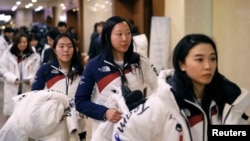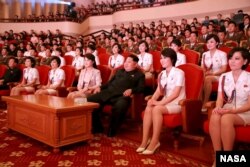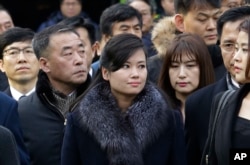North Korean defectors, who fled their impoverished and repressive homeland, are voicing concern that the North’s Olympic delegation featuring its “army of beauties” will score deceptive propaganda points, but they also hold out hope that inter-Korean cooperation can create an opportunity for peaceful progress.
A 230 member all female cheerleading squad, often called the "army of beauties," will be among the large North Korean Olympic delegation planning to visit South Korea for the PyeongChang Olympics in February.
"It will garner the spotlight, and as each of its actions can become an opportunity to promote North Korea, I consider this as a political move," said Kim Chul-woong, who was a pianist with Pyongyang University of Music and Dance, before defecting in 2002.
Charm offensive
The cheering squad is made up of attractive and relatively tall women (over 160cm,) who were selected from elite universities and have no relatives living abroad.
Perhaps the most famous former cheering squad member is Ri Sol Ju, the wife of North Korean leader Kim Jong-un. At the age of 16 she participated in the 2005 Asian Athletic Championships in South Korea.
The women cheerleaders also undergo extensive ideological education to ensure loyalty to the state and to the leadership of the Kim family.
"Leaving North Korea and visiting overseas is like going to fight in the heart of the enemy," said North Korean defector Han Seo-hee.
Han can also testify that the state’s ideological training is not always effective, as she was actually a North Korean cheerleader for the 2002 Asian Games held in Busan, South Korea, before she defected.
Misleading image
Defectors who suffered under the repressive Kim government are among the skeptics that see the North’s pause in provocative missile and nuclear tests, and its Olympic charm offensive, as part of an effort to improve its international standing, and undermine support for strong United Nations sanctions that put strict curbs on trade, including a ban on coal exports and limits on the import of oil.
The cheering squads, critics say, can be an effective propaganda tool to show a misleadingly harmonious image of the country, where the vast majority of people live in poverty, and where the leadership stands accused of crimes against humanity, based on a 2014 United Nations report that documented a network of political prison camps, and systematic human rights abuses including murder, enslavement, torture, and rape.
"I think there are many negative aspects to the cheering squad. It has the purpose of promoting that they are living normally by showing beautiful cheering squads," said Kim Chul-woong.
Bonding experience
At the same time many North Korean defectors see the Olympic related inter-Korean cooperation as a positive development that can counter adversarial political stereotypes with real people to people bonding experiences.
"I am expecting that we will be able to feel the warmth of peace in that area, regardless of politics," said Kim Ga-young who defected from North Korea in 2012.
North Korean visitors will also likely get a first hand view of the freedom and prosperity that exists in the democratic South, in contrast to how Pyongyang’s strictly controlled state media often portrays its neighbor as oppressive and poor.
Cultural cancellation
North Korea’s sudden cancellation on Monday of a joint cultural performance that was to take place on the North’s Kumgang Mountain should not impact other Olympics related cooperation, a South Korean government official said on Tuesday.
North Korea blamed the cancellation on South Korean media for encouraging "insulting" public sentiment. An official with the Unification Ministry in Seoul suggested that the North was just not prepared to host such a large-scale event, including more then 300 people on such short notice, according to South Korean media.
Many South Koreans have complained that the unified women's hockey was unfair to the South Korean players. More than a hundred petitions against the unified team have been sent to the presidential Blue House's website.
The South Korean Unification Ministry said Tuesday it expects the agreed upon training of South Korean athletes at North Korea's Masikryong ski resort on Wednesday to proceed as planned.









